During parts of 2017, many feared that the United States and North Korea were on a path to war; today, diplomatic efforts are underway and the threat of outright conflict appears diminished. Has real progress on North Korea been made, and is President Trump correct to claim credit? Six Brookings experts on North Korea weigh in.
![]() Michael O’Hanlon, Senior Fellow in the Center for 21st Century Security and Intelligence and Director of Research for Foreign Policy (@michaeleohanlon): Trump’s brinkmanship approach in 2017 seemed haphazard, impetuous, and downright dangerous at times. But on balance—and although there is a long way to go—I am supportive of what President Trump seems to be trying to achieve in his administration’s dealings with Kim Jong-un. In a fair reckoning, I would give Trump some credit. It is hardly time to celebrate in the endzone, and Trump could still very easily fumble the football. But after inheriting a Korea policy that had failed badly under his predecessors, Trump has us within possible striking distance of a touchdown—or at least a field goal, in the form of lifting some U.N. sanctions in exchange for a complete and verifiable dismantling of Pyongyang’s capacity to build more bombs.
Michael O’Hanlon, Senior Fellow in the Center for 21st Century Security and Intelligence and Director of Research for Foreign Policy (@michaeleohanlon): Trump’s brinkmanship approach in 2017 seemed haphazard, impetuous, and downright dangerous at times. But on balance—and although there is a long way to go—I am supportive of what President Trump seems to be trying to achieve in his administration’s dealings with Kim Jong-un. In a fair reckoning, I would give Trump some credit. It is hardly time to celebrate in the endzone, and Trump could still very easily fumble the football. But after inheriting a Korea policy that had failed badly under his predecessors, Trump has us within possible striking distance of a touchdown—or at least a field goal, in the form of lifting some U.N. sanctions in exchange for a complete and verifiable dismantling of Pyongyang’s capacity to build more bombs.
Recognizing the risks, I think it’s not a bad overall approach to give North Korea a stake in better relations with the United States, while at the same time keeping economic pressure and military deterrence robust. And Trump’s instinct to aim for a fundamentally transformative relationship with North Korea is actually more inspired and promising, to my mind, than the incrementalism that we’ve generally adopted for the last quarter-century.
![]() Jonathan Pollack, Nonresident Senior Fellow in the Center for East Asia Policy Studies and the John L. Thornton China Center: I concede that President Trump (unlike his predecessors) opted to initiate and sustain communication with North Korea’s senior leadership. It was far preferable to the mounting indications of late 2017 that we were on a path to war.
Jonathan Pollack, Nonresident Senior Fellow in the Center for East Asia Policy Studies and the John L. Thornton China Center: I concede that President Trump (unlike his predecessors) opted to initiate and sustain communication with North Korea’s senior leadership. It was far preferable to the mounting indications of late 2017 that we were on a path to war.
However, his actions have been improvisational rather than strategic, starting with his spur-of-the-moment decision in March to meet with Kim Jong-un. So far as I can determine, he never prepared seriously for the June meeting in Singapore—rather, the purpose of the meeting appeared to be to meet and to garner unprecedented media attention.
Kim recognized that a face-to-face meeting with the American president would legitimate him worldwide, and to some extent at home. To Trump’s credit, his “maximum pressure” campaign (especially in the latter half of 2017) elicited an unparalleled level of international cooperation to limit the North’s economic outreach. But Trump’s meeting with Kim eroded that united front.
Moreover, in Singapore Trump made no “asks” of Kim—instead, Trump made an on-the-spot pledge to end large U.S. military exercises with South Korea, which came as a complete surprise to the Department of Defense and U.S. Forces Korea. We never learned whether there was serious discussion in Singapore of what we and the North Koreans each meant by “denuclearization.” The sequencing of priorities in the joint statement suggested that nuclear weapons barely entered the conversation, if at all, which North Korea has exploited since.
![]() Richard Bush, Senior Fellow in the Center for East Asia Policy Studies and the John L. Thornton China Center (@RichardBushIII): I tend to agree with Jonathan on this. Sure, the level of tension has declined from earlier this year, but President Trump created many of these tensions himself, especially the increasing fears that the United States was prepared to attack military targets in North Korea.
Richard Bush, Senior Fellow in the Center for East Asia Policy Studies and the John L. Thornton China Center (@RichardBushIII): I tend to agree with Jonathan on this. Sure, the level of tension has declined from earlier this year, but President Trump created many of these tensions himself, especially the increasing fears that the United States was prepared to attack military targets in North Korea.
Two aspects of President Trump’s performance bother me in particular. The first is that at the Singapore summit, he essentially accepted Kim Jong-un’s definition of the Korean Peninsula situation: to prioritize U.S.-North Korea relations and the conclusion of a peninsular peace accord first, and de-nuclearization later. The long-standing U.S. position has been the reverse. In agreeing to suspend U.S.-South Korea military exercises (which Kim Jong-un blames for tensions) and telling Kim that he favored announcing the end of the Korean War, Trump enabled South Korea’s President Moon Jae-in to proceed with his dovish inter-Korean agenda.
Second is Trump’s freelancing. The U.S. government has a process to assess threats, define interests, set priorities, formulate strategy, and so on, which Trump appears to disregard. In effect, the Trump administration has two North Korea policies: promoting denuclearization (the policy of the national security agencies) and summit diplomacy, which the president conducts for his own purposes.
![]() Jung Pak, Senior Fellow in the Center for East Asia Policy Studies (@junghpak1): It may have been that President Trump’s brinkmanship last year and subsequent 180-degree turn this year were an attempt to get Kim Jong-un off kilter, to have Kim respond to U.S. actions and for Washington to try to take the initiative. I think that was worth trying to see how Kim would handle these new circumstances.
Jung Pak, Senior Fellow in the Center for East Asia Policy Studies (@junghpak1): It may have been that President Trump’s brinkmanship last year and subsequent 180-degree turn this year were an attempt to get Kim Jong-un off kilter, to have Kim respond to U.S. actions and for Washington to try to take the initiative. I think that was worth trying to see how Kim would handle these new circumstances.
But both the efforts and their implementation—threats of military action and a full course of engagement—were counterproductive and exposed our weaknesses and policy dysfunctions rather than strengthening our position. For one, the president’s apparent willingness to go to war and blunt comments from Senator Lindsey Graham that “if thousands die, they’re going to die over there”—in Korea—revealed potential seams in the U.S.-South Korea alliance and probably motivated the Moon administration in South Korea to redouble efforts on engaging Pyongyang.
As for Trump’s abrupt about-face this year, in meeting with Kim without demanding concessions, Trump wasted the leverage that a summit could have wielded, as Jonathan and Richard point out. It also left his negotiators with the burden of making those “asks,” which probably ring hollow in Pyongyang given the president’s promises to declare an end to the Korean War, cease U.S.-South Korea military exercises for now, and stop using the term “maximum pressure.” Moreover, I suppose President Trump’s gratuitous compliments to Kim were intended to lubricate the relationship, but they have also emboldened Kim to ignore difficult questions about verification and timelines—which Secretary of State Pompeo has been trying to advance—and appeal directly to Trump to neutralize those demands.
![]() Ryan Hass, David M. Rubenstein Fellow in the Center for East Asia Policy Studies and the John L. Thornton China Center (@ryanl_hass): Like others, I am relieved that the Trump administration is investing in diplomacy instead of war. But the diplomacy versus war argument always was—and still is—a false choice. The central question is not whether diplomacy is better than war, but rather whether the United States is safer now than it was before. And on that score, there’s plenty of room for healthy debate. Consider, for example:
Ryan Hass, David M. Rubenstein Fellow in the Center for East Asia Policy Studies and the John L. Thornton China Center (@ryanl_hass): Like others, I am relieved that the Trump administration is investing in diplomacy instead of war. But the diplomacy versus war argument always was—and still is—a false choice. The central question is not whether diplomacy is better than war, but rather whether the United States is safer now than it was before. And on that score, there’s plenty of room for healthy debate. Consider, for example:
- North Korea has reportedly upgraded nuclear enrichment sites and expanded production of solid fuel engines for its missiles;
- The maximum pressure campaign is losing steam, as China and Russia are now calling for relaxation of sanctions. Russia, in particular, has become flagrant in its disregard of sanctions;
- Gaps appear to be widening between Seoul and Washington in their respective approaches toward North Korea; and
- North Korea’s relations with all of its land-based neighbors are improving. Inter-Korean relations are advancing rapidly, exchanges between Beijing and Pyongyang are deepening, and Moscow hosted the first-ever China-Russia-North Korea trilateral meeting this month.
In other words, North Korea in the past year has successfully loosened external pressure and gained greater international acceptance without making any permanent concessions on its nuclear and missile programs.
Some may argue that more patience is needed, as President Trump has set in motion a leader-level process that will lead to a grand bargain. I hope so, but the paucity of progress on denuclearization at the Singapore summit and since does not provide cause for optimism. Others may contend that the situation is improved now because North Korea is not testing missiles or nuclear weapons. The absence of such tests certainly is preferable to the occurrences of them. But the fact remains that North Korea appears to be improving its nuclear and missile stockpiles, not dismantling them.
So, to borrow Michael’s football metaphor, Pyongyang appears to be moving the ball toward the end zone. Is Washington?
![]() Robert Einhorn, Senior Fellow in the Center for 21st Century Security and Intelligence and the Arms Control and Non-Proliferation Initiative: While I agree with most of my colleagues’ strong criticism of President Trump’s handling of the North Korea issue, I think it’s only fair to acknowledge, as Mike O’Hanlon has done, where he deserves some credit. In particular:
Robert Einhorn, Senior Fellow in the Center for 21st Century Security and Intelligence and the Arms Control and Non-Proliferation Initiative: While I agree with most of my colleagues’ strong criticism of President Trump’s handling of the North Korea issue, I think it’s only fair to acknowledge, as Mike O’Hanlon has done, where he deserves some credit. In particular:
- Significant progress with the North Korean regime requires engagement at the most senior level. I saw this in October 2000 when I accompanied Secretary of State Albright to Pyongyang, where we made more headway on missile issues in an hour of discussions with Kim Jong-il than we had made in years of negotiations at lower levels. This is not to excuse the woeful short-circuiting of professional-level preparations for the Singapore summit. But Trump’s penchant for leader-to-leader diplomacy has its place in dealing with North Korea.
- In 2017, the Trump administration capitalized on the international community’s alarm with North Korea’s thermonuclear and intercontinental ballistic missile tests by exercising the leadership necessary to gain U.N. Security Council approval of a very tough package of sanctions that, by the end of the year, had really begun to bite.
- The steps North Korea has taken to demonstrate a commitment to the denuclearization agenda are reversible and provide no indication that Kim Jong-un is serious about giving up his nuclear deterrent completely. But they should not be dismissed as meaningless, especially the suspension of nuclear weapon tests and missile flight tests, now in place for almost a year. Of course, technical advances in the programs can be made without high-profile testing. But the longer the suspension lasts, the greater the impediment to Pyongyang developing more capable and threatening systems.
- President Trump recognizes that, especially in dealing with a relatively weak and insecure negotiating “partner,” a show of respect can pay dividends. To be sure, Trump’s way of showing respect for North Korea’s brutal dictator (“we fell in love”) is bizarre, undignified, and way over the top. But the instinct to establish some personal rapport with a leader of whom the United States is making strong demands, even a highly distasteful leader, is hardly unprecedented in the annals of U.S. diplomacy.
- The president seems to have come to the realization, albeit belatedly, that the process of negotiating and implementing denuclearization will not be quick or easy, conceding that it could take several years, considerably longer than some of his advisers are calling for.
- Most fundamentally, President Trump deserves credit for shaking up the dynamics of the North Korea issue, perhaps creating opportunities for finding a way out of an impasse that has bedeviled U.S. policymakers for decades. The opportunities created almost surely will not lead to achievement of the ambitious goals the administration is currently pursuing— especially the complete and rapid denuclearization of North Korea. But they could lead to less ambitious outcomes that nonetheless serve the interests of the United States and its Asian allies.
While it would be unfair to deny the president any credit for his efforts on North Korea, it would also be wrong not to recognize that the Trump balance sheet on North Korea, at least so far, is heavily in deficit—which I detail below.
Pak: Trump wasted the leverage that a summit could have wielded.
on mistakes since singapore
O’Hanlon: I agree that Trump has made lots of mistakes. After his June Singapore summit with Kim, Trump very prematurely declared an end to a North Korean nuclear threat, and his talk of a warm relationship with Kim goes too far, given the latter’s human rights record. We need a sense of where diplomacy is headed before we talk about a second summit. There are also cracks in the U.S.-South Korea partnership in dealing with North Korea, and even wider fissures in our collaboration with China.
All that said, the United States is keeping pressure on North Korea with unrelenting economic sanctions. Even if enthusiasm for those sanctions is waning in some quarters, the Korea Development Institute reports a 40-percent reduction in North Korea’s trade with the outside world through the first half of 2018. That means we still have real leverage. The U.S.-South Korea military alliance is firmly intact. Suspending our large-scale exercises with South Korea for a time is a small price to pay for the ongoing moratorium on North Korean nuclear and missile tests (even if this was not negotiated as a formal quid pro quo agreement)—largely because we can substitute those large exercises with more numerous and equally effective smaller ones. The ongoing talk of signing a declaration of non-hostilities, if kept low-key and linked to progress on the nuclear file, does not seem overly dangerous to me.
Pollack: I see recent developments somewhat differently. Ever since the Singapore summit, the administration (especially Secretary of State Mike Pompeo) has been trying to rewrite the script for what it failed to achieve. During his third visit to Pyongyang in August, Pompeo sought to obligate the North Koreans to American terms of reference, and claimed progress after departing. But he was immediately trashed by Pyongyang, which resorted to language that seemed to return matters to square one.
Secretary Pompeo should have known better. No North Korean official (least of all Kim Jong-un) has ever made a commitment to “the denuclearization of North Korea.” Instead, the DPRK has developed exquisitely hedged and endlessly flexible formulas by which it dangles possibilities without undertaking irrevocable actions, while it awaits concessions from outside powers, especially the United States. The North has never wavered from its fundamental goals: garnering American acceptance of its legitimacy as a nuclear-armed power, gaining parallel acceptance as a normal state, and degrading and working toward the ultimate dissolution of the U.S.-South Korea alliance.
Pak: I am glad that we finally have a special representative for North Korea policy, Steve Biegun, who can conduct the shuttle diplomacy required to ensure that Beijing, Tokyo, and Seoul are on the same page and to keep international pressure on Pyongyang. I also hope that his appointment means that the Trump administration is serious about getting North Korea to sit down and talk about the technical steps required to move us toward North Korea’s denuclearization, rather than relying on summits to try move the needle. I worry, however, that talk of another Trump-Kim summit will soak up all of the attention and energy of U.S. policymakers and negotiators.
If President Trump meets with Kim again, I hope that he would give his working-level officials the time and the space to negotiate the terms and desired outcomes of the summit with their North Korean interlocutors, including, as Jonathan mentions, what denuclearization actually means. I think it’s also critical that Trump says in no uncertain terms that he has empowered Biegun to negotiate on behalf of the United States on timelines and verification measures, at least in part, to dispel Kim’s perception that he can continue to appeal to Trump directly.
Einhorn: The Trump balance sheet on North Korea, at least so far, is heavily in deficit:
- For pursuing a national security issue of cardinal importance without discipline, essential knowledge, or coherence;
- For entering the Singapore summit utterly unprepared, with unfounded confidence in the force of his personality to overcome his adversary’s determination to protect long-standing, core national interests;
- For undercutting his own maximum pressure campaign, perhaps irretrievably, including by prematurely and ridiculously declaring that North Korea is no longer a nuclear threat;
- For surprising his allies and even his administration by impulsively agreeing to meet with Kim Jong-un, suspending U.S.-South Korean joint military exercises, and perhaps privately committing to support an end-of-war declaration; and
- For engaging in wishful thinking that, despite the assessment of his intelligence community and the views of virtually all experts on North Korea, Kim Jong-un is willing to eliminate his nuclear weapons completely and to proceed down the path of denuclearization even if the United States withholds reciprocal benefits until the end.
looking forward
Bush: Looking forward, I suspect that the current period of lower tensions will not last, for two reasons. The first is that Kim Jong-un will not get the sanctions relief that he probably hopes for, because the advocates of denuclearization will argue that keeping sanctions is necessary to induce a more favorable North Korean negotiating position. To convey its dissatisfaction, North Korea may conduct new missile and nuclear tests, something it has done before, or otherwise challenge various U.N. Security Council resolutions (such as by testing another of a long-range rocket, justified as a satellite launch).
Bush: Is it realistic that Pyongyang would actually agree to and carry out full and final denuclearization in return for a robust package of incentives?
The second is that the whole rationale for North Korea’s nuclear and missile programs is its purported fear of a U.S. nuclear attack and the perceived need to be able to retaliate. So at some point, it must test in order to show that it can now put the United States at risk.
Finally, is it realistic that Pyongyang would actually agree to and carry out full and final denuclearization in return for a robust package of incentives? The broad expert consensus is that the probability is essentially zero. So why are the United States and others acting on the premise that denuclearization is still possible? Policymakers must contemplate what to do once all accept that the objective of their diplomatic efforts cannot be achieved. One option is containment and the other is appeasement. The national security agencies of the Trump administration, like the Obama administration before it, has been laying the foundation for a comprehensive containment policy. Simultaneously, it appears, the president is pursuing appeasement.
Pollack: Moving forward, Trump seems to believe that his open flattery of Kim Jong-un and the allure of a modern North Korea (presumably laden with hotels and casinos) will suffice to close an as-yet unspecified “deal.” It also seems certain that the president wants a second face-to-face meeting with Kim Jong-un, and administration officials (including Secretary Pompeo) imply that it will take place soon, perhaps even before the end of the year.
Trump clearly views relations with North Korea as one of his administration’s singular foreign policy accomplishments. But without tangible evidence that the United States and North Korea are anywhere close to a compatible conception of the road ahead, the claims of “progress” will ring increasingly hollow. A second meeting then runs the risk either of failure or of an outcome that damages fundamental American interests. The United States will have squandered any initiative it did have, as other actors (including South Korea) proceed down their own paths with North Korea. Having disparaged the approaches favored by his predecessors and having claimed unprecedented breakthroughs, what does President Trump do then?
Einhorn: Despite the many missteps, it is too early to declare Trump’s North Korea policy a failure. Although his administration’s goal of the complete and rapid denuclearization of North Korea is not in the cards, the president may nonetheless be able to achieve a valuable and more realistic goal—a verifiable agreement that limits and reduces North Korea’s nuclear and missile capabilities, while committing the parties to continue to work toward complete denuclearization down the road. Such an agreement, together with further progress in inter-Korean relations, conventional confidence-building measures, and the preservation of the U.S.-South Korea security alliance and a strong U.S. military presence in South Korea, would reduce the risks of war and enhance stability on the Korean Peninsula and East Asia.
Pak: We can’t afford to grade President Trump on a curve because Kim Jong-un is certainly not grading on a curve. Advocates of lifting sanctions and a peace declaration have touted engagement for engagement’s sake, arguing that at least we’re not at war and that we need to give Kim the benefit of the doubt and have faith that he’s made a strategic shift, despite the regime’s explicit statements that it would not “unilaterally” denuclearize, Kim’s promise to “mass produce” nuclear weapons, and reports that Pyongyang continues to covertly advance its nuclear weapons program. Ultimately, Kim’s aggressive development of nuclear weapons in his first six years and his aggressive engagement approach in 2018 are two sides of the same coin: a strategy aimed at keeping and advancing North Korea’s nuclear weapons program, bolstering Kim’s status, removing U.S. troops from the Korean Peninsula and eroding the U.S.-South Korea alliance, maintaining strategic relevance in the region, and potentially trying to create conditions for unification on his terms.
We should support the current mood of diplomacy without letting Kim dictate the terms of engagement. Kim’s current approach and attitude is not that of a man looking for credible reasons to give up the strategic programs that his grandfather started, his father nurtured, and he says he perfected. Rather, his posturing and refusal to discuss verification measures, suggest he perceives that he is engaging from a position of strength and not weakness.
The success of Washington’s engagement with Kim lies in our ability to keep our alliances strong, maintain fidelity to a policymaking process that assesses the threat and formulates strategy in a whole-of-government way, and stay consistent in our messaging and demands of North Korea—as well as an articulation of what we are willing to provide in response to credible North Korean measures.
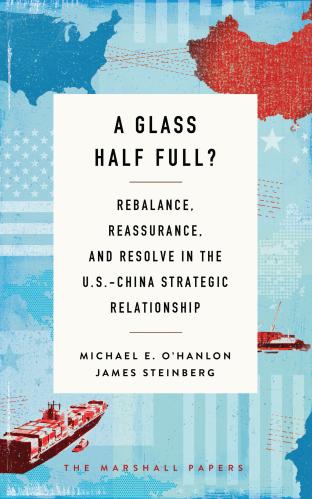
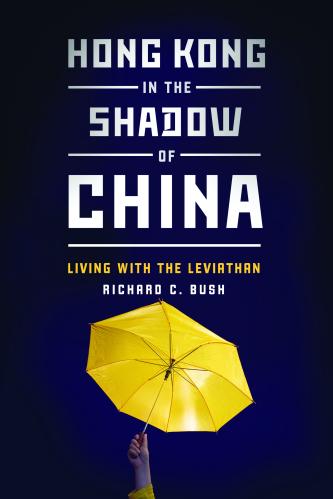
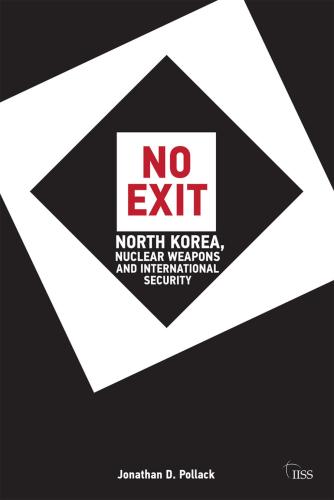
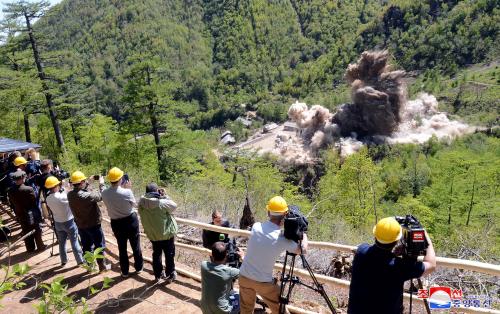
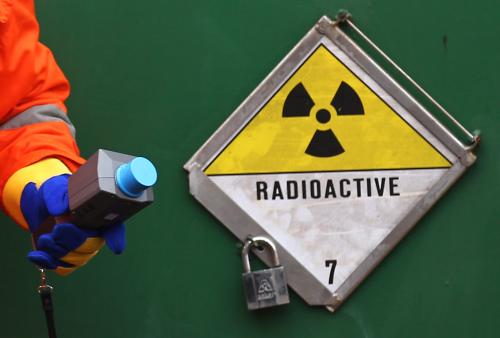
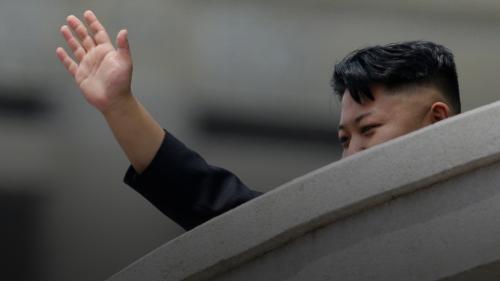






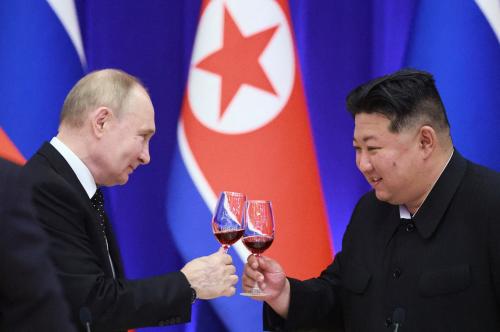

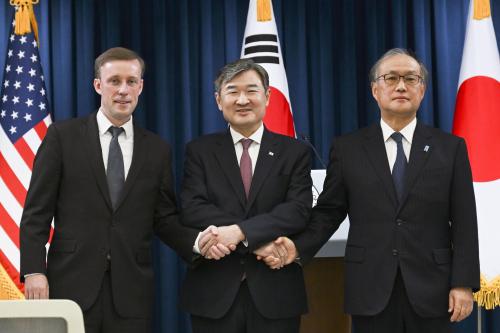
Commentary
Around the halls: Can President Trump claim credit for progress on North Korea?
October 19, 2018